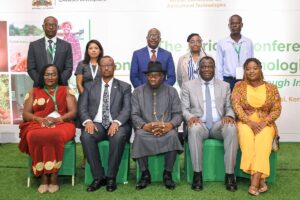
Amidst the backdrop of the first African Conference on Agricultural Technologies (ACAT) held in Nairobi, Kenya, from October 31 to November 3, 2023, a collective recognition of the pivotal role of technology in driving agricultural innovation for economic growth and development in Africa emerged. Convened by the Government of Kenya and the African Agricultural Technology Foundation (AATF), with support from partners, the conference explored the theme “Agricultural Resilience through Innovation.”
As we delve into the resolutions and acknowledgments arising from ACAT, it becomes evident that the aspirations for Africa’s agricultural transformation, as outlined in the Comprehensive Africa Agriculture Development Programme (CAADP), the commitments of the Malabo Declaration, and the broader frameworks of Agenda 2063 and the Science Technology and Innovation Strategy for Africa (STISA) 2024, are at the forefront of the continent’s agenda.
One of the paramount concerns highlighted during ACAT is the insufficient investment in Research & Development (R&D) in Africa, standing at 0.5% of GDP, significantly below the global average of 1.8%. This disparity translates into a sluggish pace of research in critical sectors such as agriculture. The agricultural sector, including livestock production, was acknowledged for its critical role in supporting livelihoods, industrial growth, and overall economic development across the continent.
Building upon the commitments made during the Second Africa-wide conference on Science Technology and Innovation (STI) in Kigali-Rwanda in April 2022, ACAT underscored the importance of intensifying efforts on the commercialization and deployment of technologies for the benefit of local communities. The challenges faced by youth, women, and people with disabilities engaged in agriculture were also recognized, including limited access to opportunities, technologies, and productivity-enhancing resources.
Notably, ACAT emphasized the potential of technology adoption to reduce Africa’s substantial food import burden while facilitating intra-Africa trade. The urgent need to enhance farmer resilience in the face of climate change, armed conflict, and socio-political instability was highlighted, along with regret for the persisting use of rudimentary tools in African agriculture and the low penetration of agricultural mechanization.
In the context of these pressing issues, Savanna Circuit Technologies’ efforts to support dairy communities in Kenya align seamlessly with the resolutions of ACAT. By leveraging innovative solutions, such as hybrid milk chillers, solar dryers, and dairy management ERPs, Savanna Circuit contributes to the advancement of agricultural technology tailored to local conditions. The company’s focus on sustainable practices aligns with the broader goals outlined during ACAT, aiming to enhance productivity, reduce post-harvest losses, and empower local communities.
As Africa moves forward, lessons gained from past and present efforts emphasize the compelling need for an African-centered approach to agricultural transformation through the development and deployment of technological solutions. Savanna Circuit’s endeavors stand as a testament to the potential impact of technology on local communities, aligning with the vision outlined during ACAT for a resilient, innovative, and technology-driven agricultural sector in Africa.

